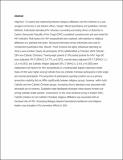HIV and Religion in the Congo: A Mixed-Methods Study

Date
2013Author
Ngigi, Simon K.
Hawkes, Michael
Sivasivugha, Eugenie S.
Masumbuko, Claude K.
Brophy, Jason
Kibendelwa, Zacharie T.
Metadata
Show full item recordAbstract
Objective: To explore the relationship between religious affiliation and HIV infection in a war-ravaged community in sub-Saharan Africa. Design: Mixed quantitative and qualitative methods. Methods: Individuals attending HIV voluntary counseling and testing clinics in Butembo in Eastern Democratic Republic of the Congo (DRC) completed a questionnaire and were tested for HIV infection. Risk factors for HIV seropositivity were explored, with attention to religious affiliation as a potential risk factor. Structured interviews of key informants were used to complement quantitative data. Results: Three hundred and eighty individuals attending six clinics were enrolled. Nearly all participants (97%) selfidentified as Christian (44% Catholic; 53% non-Catholic Christian). Twenty-eight patients (7.4%) tested positive for HIV. Age>30 years (adjusted OR 47 [95%CI 2.9-770, p=0.007]), married status (adjusted OR 3.7 [95%CI 1.1-13, p=0.037]), and Catholic religion (adjusted OR 2.7 [95%CI 1.1-6.8, p=0.030]) were independent risk factors for HIV seropositivity in a multivariable logistic regression model. Rates of HIV were higher among Catholic than non-Catholic Christian participants in both single and married participants. The proportion of participants reporting condom use as a primary prevention modality did not differ significantly between religious groups; however, within both Catholic and non-Catholic Christian groups, increasing church attendance was associated with decreased use of condoms. Qualitative data highlighted divergent views toward condom use among Catholic health workers. Conclusions: In this cross-sectional survey in Eastern DRC, Catholic (relative to non-Catholic Christian) religious affiliation was associated with an increased risk of HIV. Increasing dialogue between biomedical practitioners and religious leaders may strengthen HIV prevention efforts in SSA.
URI
https://doi.org/10.2174/1570162X113119990002https://repository.kcau.ac.ke/handle/123456789/1599
